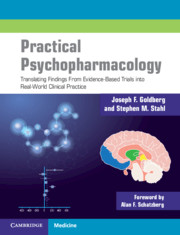 Practical Psychopharmacology
Practical Psychopharmacology Book contents
- Practical Psychopharmacology
- Practical Psychopharmacology
- Copyright page
- Dedication
- Contents
- Foreword
- Preface
- Abbreviations
- Part I General Principles
- 1 Core Concepts of Good Psychopharmacology
- 2 Targets of Treatment: Categories versus Dimensions of Psychopathology
- 3 Interpreting and Using the Literature: Integrating Evidence-Based Trials with Real-World Practice
- 4 Placebo and Nocebo Effects
- 5 Tailoring the Fit: Moderators and Mediators of Treatment Outcome
- 6 Complex Regimens and Rationale-Based Combination Drug Therapies
- 7 Laboratory Values and Psychiatric Symptoms: What to Measure, What Not to Measure, and What to Do With The Results
- 8 Pharmacogenetics: When Relevant, When Not
- 9 Cross-tapering and the Logistics of Drug Discontinuation
- 10 Managing Major Adverse Drug Effects: When to Avoid, Switch, or Treat Through
- 11 Novel Drug Therapeutics: Nutraceuticals, Steroids, Probiotics, and Other Dietary Supplements
- 12 Human Diversity and Considerations in Special Populations
- Part II Targets of Pharmacotherapy
- References
- Index
11 - Novel Drug Therapeutics: Nutraceuticals, Steroids, Probiotics, and Other Dietary Supplements
from Part I - General Principles
Published online by Cambridge University Press: 19 October 2021
- Practical Psychopharmacology
- Practical Psychopharmacology
- Copyright page
- Dedication
- Contents
- Foreword
- Preface
- Abbreviations
- Part I General Principles
- 1 Core Concepts of Good Psychopharmacology
- 2 Targets of Treatment: Categories versus Dimensions of Psychopathology
- 3 Interpreting and Using the Literature: Integrating Evidence-Based Trials with Real-World Practice
- 4 Placebo and Nocebo Effects
- 5 Tailoring the Fit: Moderators and Mediators of Treatment Outcome
- 6 Complex Regimens and Rationale-Based Combination Drug Therapies
- 7 Laboratory Values and Psychiatric Symptoms: What to Measure, What Not to Measure, and What to Do With The Results
- 8 Pharmacogenetics: When Relevant, When Not
- 9 Cross-tapering and the Logistics of Drug Discontinuation
- 10 Managing Major Adverse Drug Effects: When to Avoid, Switch, or Treat Through
- 11 Novel Drug Therapeutics: Nutraceuticals, Steroids, Probiotics, and Other Dietary Supplements
- 12 Human Diversity and Considerations in Special Populations
- Part II Targets of Pharmacotherapy
- References
- Index
Summary
The relationship between food products and pharmacodynamically active agents traces at least to antiquity, even if Hippocrates never actually did say “let food be thy medicine and medicine be thy food” (Cardenas, 2013). In modern times the relationship between dietary supplements and medicine has come to pose a rather peculiar dichotomy between what might be called “legitimate” or “mainstream” medicine and nonstandard or “alternative” medicine. Interventions in the latter category suffer from issues of credibility due to an often less rigorous RCT database, at times poorly established rationales and/or mechanisms of action, and lack of regulatory agency product oversight for quality assurance purposes. Many patients obtain information about herbal products or dietary supplements simply from internet searches with little awareness of the scientific rigor or credibility behind advertising claims or consumer postings and testimonials, or cognizance of potential pharmacokinetic interactions.
- Type
- Chapter
- Information
- Practical PsychopharmacologyTranslating Findings From Evidence-Based Trials into Real-World Clinical Practice, pp. 221 - 243Publisher: Cambridge University PressPrint publication year: 2021


